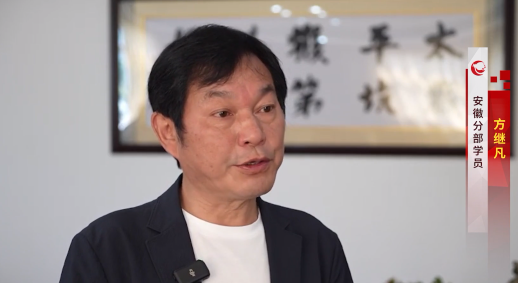 Guest Profile
Guest Profile

Fang Jifan, a student enrolled in the Rural Economic Management programme at the Huangshan Campus of the Anhui Branch of the Open University of China (OUC)in the autumn of 2006, now serves as the secretary of the Party Branch and director of the Village Committee of Houkeng Village, Xinming Township, Anhui Province. He is also the chairman and general manager of Huangshan City Houkeng Tea Co. Ltd. Furthermore, he is the representative inheritor of the national intangible cultural heritage project, Taiping Houkui tea (a type of green tea) crafting technique. He has been honoured with titles such as "National Science Popularisation Leader" and "Top Ten Rural Leaders in China".
Q: Why did you choose to study at the OUC in the first place?
A: I grew up in a mountainous rural area and used to live in poverty. After leaving the military, I entered the workforce and started a business. Later, through my efforts in promoting and developing our hometown's tea industry, I enabled the villagers to live a prosperous life within three years. In 2004, I was elected as the village committee director. Realising my lack of relevant knowledge, I seized an opportunity when the Organisation Department of the CPC Central Committee and the OUC jointly launched the "One College Student Per Village" programme. I was among the first to enrol, majoring in Rural Economic Management, which is crucial for a village committee director.
Q: What have you gained from your studies at the OUC?
A: Through my studies at the OUC, I have instilled knowledge into the villagers. Previously, they lacked brand awareness and didn't understand why our tea couldn't fetch a good price. Subsequently, we established village regulations to protect the origin of our tea, introduced modern management practices, and attracted more consumers to our village to purchase a cup of premium Taiping Houkui tea. We also formed a professional cooperative with about 30 households, allowing families to gather and learn together, thereby preserving the intangible cultural heritage of Taiping Houkui tea. Many village Party committee secretaries are graduates of the "One College Student Per Village" programme.
Our hometown has been transformed from a once-impoverished village into a prosperous community, now recognised as one of China's top ten Villages of Happiness. This remarkable evolution and the relentless efforts over the years are profoundly connected to the education and insights I gained through my studies at the OUC.
Q: What was the most valuable thing you gained during your studies at the university?
A: Firstly, the OUC offered a great learning atmosphere, and secondly, it provided rich learning content. I deeply realised that learning is not just about reading; it's about mutual exchange and experiential learning, which enriched my knowledge and enabled better application in rural practices.
Q: What best wishes would you like to send to the OUC at the 45th anniversary of its founding?
A: I wish my alma mater a future where it continues to cultivate and foster a multitude of talented individuals who excel in every field. May it make new and greater contributions to the construction of a learning society that promotes lifelong learning for all.